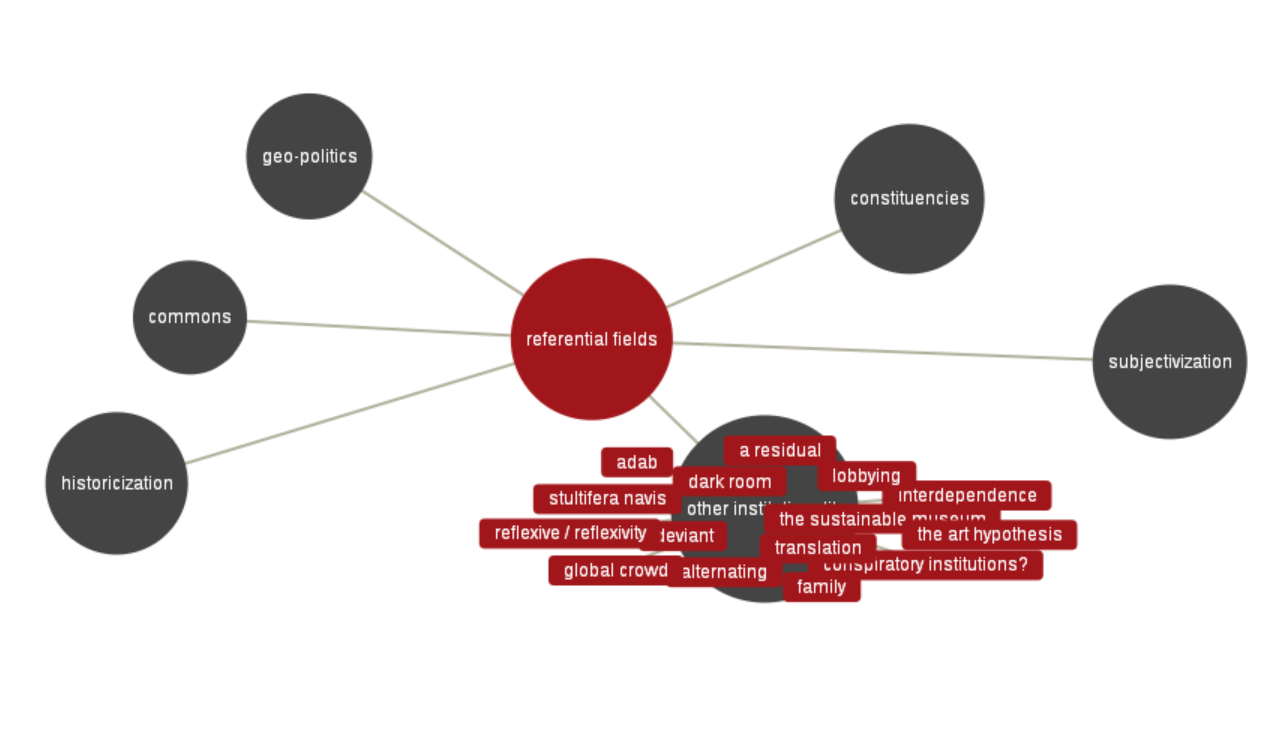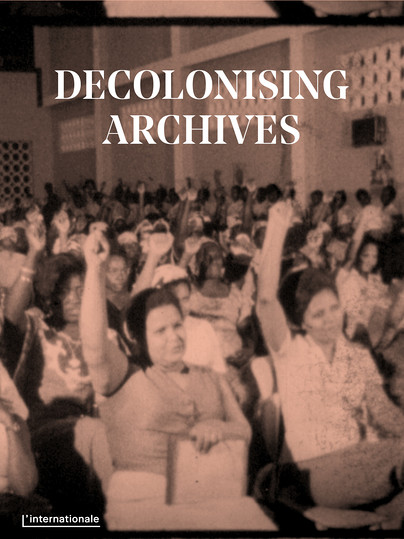Glossary of Common Knowledge (2017)
Filed under book | Tags: · art theory, commons, contemporary art, geopolitics, glossary, history, politics, subjectivation, subjectivity, theory

The Glossary of Common Knowledge is a research project by MG+MSUM, Ljubljana, in the frame of L’Internationale, aiming to negotiate various positions, contexts and local narratives about contemporary art. The glossary entries were produced through six seminars (2014-17), each focusing on one selected referential field: historicization, subjectivization, geo-politics, other institutionality, and commons. The resulting website now functions as an open platform accepting new contributions.
Fields and terms:
Historicization: archive, constellation, emancipation, temporally embodied sound, estrangement, heterochronia, humanism, intuition, pathological fracture, phantom (pain), reconstruction, self-historicization, temporalities, tendencies in art, the contemporary.
Subjectivization: creleasure, dancing as insurrectional practice, decolonize, evidence, fragility, interest, kapwa, loser, over-identification, radical imagination, self-determination, self-representation, on subjectivization, the subject, travesti, unrest.
Geo-politics: agitational visual language, alignment, catastrophe, eurasia, event, global resistance, institutional geopolitical strategies, migrancy, non-aligned movement, pandemic, postsocialism, south, tudigong, god of the land, white space.
Constituencies: agency, autonomy, biotope, bureaucratisation, collaboration / co-labour, construction, the continuity-form and counter-continuity, de-professionalization, intervenor, labour, ñande / ore, the eternal network / la fête permanente, the rest is missing.
Commons: to baffle, basic income, the brotherhood & unity highway, constituent power of the common, corrected slogan, data asymmetry , friendship, heterotopian homonymy, institution, noosphere, palimpsest, rog, self-management, solidarity, theft.
Other institutionality: a residual, adab, alternating, conspiratory institutions?, dark room, deviant, family, global crowd, interdependence, lobbying, reflexive / reflexivity, stultifera navis, the sustainable museum, the art hypothesis, translation.
Curated by Zdenka Badovinac, Bojana Piškur and Jesús Carrillo (MNCARS) in collaboration with L’Internationale, et al
Publisher MG+MSUM, Ljubljana, 2017
HTML (on the website of MG+MSUM)
HTML (on the website of L’Internationale, added on 2020-4-12)
Seminar recordings structured by terms discussed
L’Internationale, Rado Ištok (eds.): Decolonising Archives (2016)
Filed under book | Tags: · archive, art, colonialism, commons, politics, technology

This publication “aims to show how archives bear testimony to what was, even more so than collections. Archives present documents that allow one to understand what happened and in which order. Today Internet technology, combined with rapid moves made on the geopolitical chessboard, make archives a contested site of affirmation, recognition and denial. As such, it is of great importance to be aware of processes of colonialisation and decolonisation taking place as new technology can both be used to affirm existing hegemonic colonial relationships or break them open.”
Publisher L’Internationale Online, 2016
Creative Commons BY-NC-SA License
111 pages
HTML
PDF, PDF (8 MB)
EPUB, EPUB (8 MB)
Geert Lovink, Nathaniel Tkacz, Patricia de Vries (eds.): MoneyLab Reader: An Intervention in Digital Economy (2015)
Filed under book | Tags: · bitcoin, commons, crowdfunding, economy, market, money, neoliberalism, technology

“MoneyLab is part of a global movement that demands the democratization of the design of our financial futures. Audacity is essential in times of crisis. And so we must engage constructively with hackers, entrepreneurs, and other creators who take up the call for economic alternatives. One first step is a map of the present: What works and what doesn’t? What is worth pursuing and what must be left aside? Which histories bear on the present moment? And what are the limits of our economic imagination?
The MoneyLab Reader brings developments in crowdfunding, currency design, technologies of payment, and other economic experiments into dialogue. The authors of this volume discuss the implications of the current architecture of global finance, its impact on ever-growing income disparity, and question money and finance as such. It is not always clear, for instance, whether genuine alternatives are unfolding or if we are simply witnessing the creative extension of neoliberalism.”
Contributors: Irwan Abdalloh, Franco ‘Bifo’ Berardi, Robert van Boeschoten, Finn Brunton, Paolo Cirio, Jim Costanzo, Primavera De Filippi, Eduard de Jong, Irina Enache, Andrea Fumagalli, David Golumbia, Max Haiven, Keith Hart, Samer Hassan, Ralph Heidenreich, Stefan Heidenreich, Geert Lovink, Bill Maurer, Rachel O’Dwyer, Pekka Piironen, Lena Rethel, Renée Ridgway, Andrew Ross, Stephanie Rothenberg, Douglas Rushkoff, Saskia Sassen, Inge Ejbye Sørensen, Lana Swartz, Erin B. Taylor, Tiziana Terranova, Nathaniel Tkacz, Pablo Velasco González, Akseli Virtanen and Beat Weber.
Foreword by Saskia Sassen
Publisher Institute of Network Cultures, Amsterdam, 2015
INC Reader series, 10
Creative Commons BY-NC-SA 4.0 Unported License
ISBN 9789082234558
308 pages

